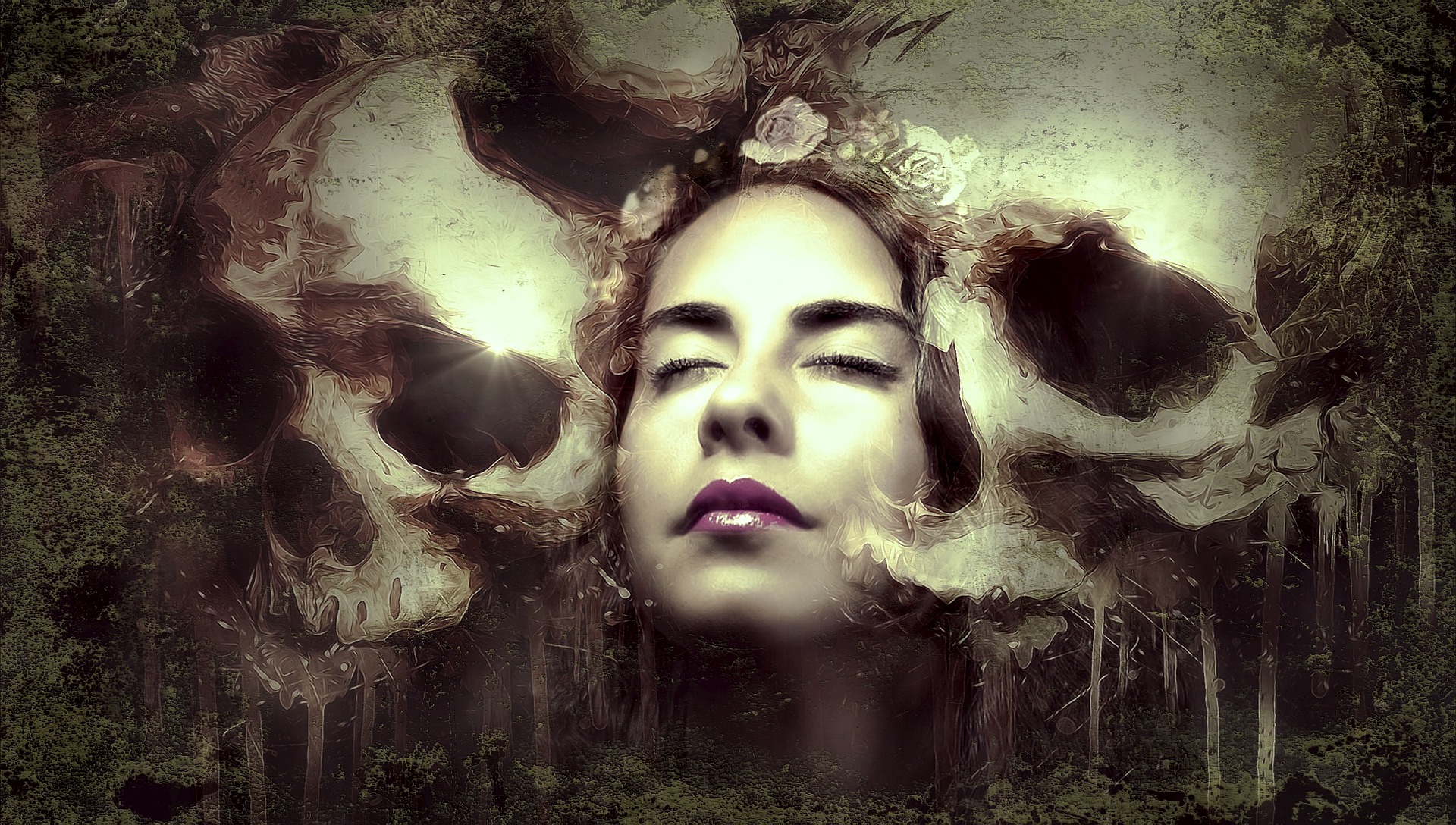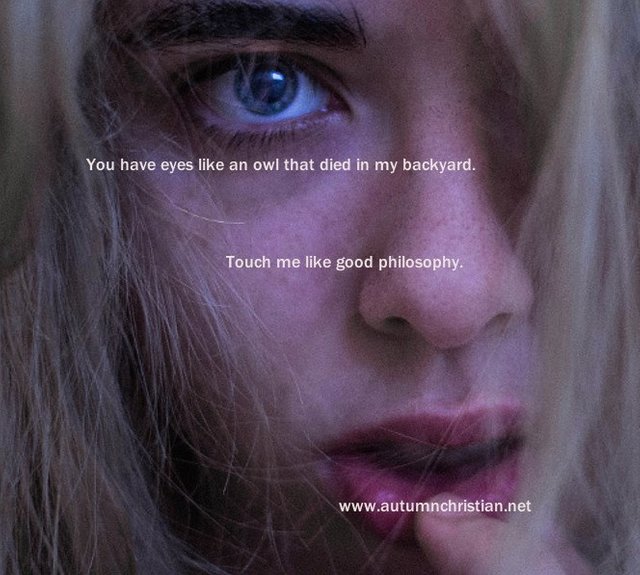[Fictional Memoir] In the Palace of Bones & Champagne

I wanted to be a palace of bones, my skin replaced with ivory, my blood drained away to make room for absinthe and champagne. I could see the girl I wanted to be in pictures, in sideway glances - not just thin, but emaciated. She wore a thick sweater because she was always frozen, look how her feet curl, her hands turning monochrome as she clutches a cup of coffee. I wanted to be a girl without a face, a gash where my nose and ears should be, all big gray eyes. They would call me waif, ethereal, fairy girl. I’d sit in the back of cocktail lounges, in the back of cabs, with my legs pulled into my chest and my hair strung across my face. I’d wear blazers stolen from artists, splashed with paint. I’d leave behind me glitter and skin, until everything wore away. Adderall and coffee and wine and cigarettes would be a new kind of food for a creature like me.
I didn’t want to be average in any way, and that included my weight. It wasn’t enough to be pretty. Anyone could be pretty, although most days I felt ugly and cast in shadow - my face a wreck, smeared in red, my lips dehydrated, my fingernails full of dirt. I wanted to be a work of tragic art. I wanted to balance on the precipice between life and death, frozen, ghastly and elegant in my act. See how I come to the edge and pull myself back, like I have the thin strings of my heartbeat attached to the tip of my tongue, my fingers. I’d play myself like an out of tune piano, perfect in its imperfectness, each discordant note a statement. I can’t just be a brilliant writer, or a compassionate lover. I can’t just be an amazing game designer, or publish multiple novels. I must be a hunger artist . The composition of my body must be extraordinary.
But the picture stayed where it was - in the picture - and when I tried to climb inside it kicked me out.
I can’t stop the flow of blood, and wine is a devil on an empty stomach. I can’t go to parties when I’m hunched on the kitchen floor, tracing my cigarette burns with a knife in sick pride. Yes, I am human and I am wounded, the scars say. I am stronger than the girl with satin, unmarked skin, because I’ve plunged down and come back up.
Even in my sickness I must make myself feel special somehow. I once thought I lived by the words, “always be honest,” but that was another lie. Honesty is a relative, ephemeral smoke cloud. In the pursuit of total honesty, I only dredged up more lies. I am a garden of inconsistency and contradiction, like every other human being. I thought honesty would save me from complacency, but if I had been honest with myself I wouldn’t have laughed when I wiped the vomit off my mouth, stumbling out of the restroom in the bar where I first learned to stick my fingers down my throat. When I grabbed my girlfriend by the shoulders and said, “this feels so good.”
When I uttered the words:
“I’m still in control.”
If I was to live by any words it would not be “always be honest.” It would be “never be boring.” To be boring is the greatest sin, after all, and in the church of Autumn Christian, vengeful scorpio, there is no forgiveness.
There is only punishment and revenge. There is only perfection that passes through the body like a fire, burns and scratches and starvation. For the last year, not an hour goes by where I haven’t thought about food and fat and how I’m ravaging my body, the best ways to destroy myself. “Never be boring.” I’ve betrayed myself. In searching for the extraordinary, I’ve whittled my brain down to a single, boring question.
When will I eat?
“Are you an anorexic, Autumn?” an equally thin co-worker jokes at a company party, putting his hands on his hips. I laugh with him. One day after work I decide to walk to the pier a half a mile away, and nearly collapse unconscious, out of breath and sweating. I don’t recognize myself in the mirror. The bones are a museum that I sweep my fingers over every day, curating, collecting dust. I can’t sit down without bruising my back because the fat is so thin. I can’t shave my underarms because they’re so sunken into my body. I’m scared that if someone hits me on the back of the neck they’ll paralyze me for life.
“Eat some meat, baby girl.” “You’re looking very chic these days.” “Just like a movie star.” “Dude, eat a bagel.” “You look like a heroin addict.” “Hey, baby girl.” “Autumn, you never eat.”
I blamed my starvation on the medication making me nauseous. But the truth is I could force myself to eat if I wanted to. I pretended that I’m worried about weight loss while drinking low calorie muscle milk for breakfast and lunch. I picked at muffins to get my blood sugar up. I drank pot after pot of coffee, sometimes up to 12 or 13 cups a day, just to maintain energy levels. I sat in my office chair and my body groaned underneath me, a rickety, distressed house.
I thought it started when I worked at my first office job, quickly gaining twenty-five pounds over the course of six months and being horrified at myself.
But I’d been this way for a while and never even knew it. I remembered being in second grade and scrutinizing myself in the mirror. I was my own science experiment. How long could I stand the pain of tearing on the skin of my stomach, pulling up my shirt to study the “fat” of my thin, pre-pubescent body. Nobody ever called me fat, or told me to watch my diet - but I still felt enormous, different. I had a body that could bust down walls. I could throw out my arms and take down cities with my terrible, groaning girth.
You’d laugh at me if you could see the pictures of me at that time, a petite thin little girl with a blonde bowl haircut, dimpled cheeks and soft, voluminous dresses.
Later I gained weight and became chubby in adolescence. My mother told me, “boys like it when you don’t eat a lot.” She yelled at me for eating cookies. I went on starvation diets that always failed, exercise routines that I found miserable. I consigned myself to being the fat, ugly geek who stayed inside writing and playing video games. I didn’t have to be beautiful if I was intelligent. I didn’t have to be thin if I could write worlds of beautiful mechs and beat the boys in any mental game.
It was somewhere around age 17 when I picked up a piece of chocolate left out in a dish. A shockwave passed through me. I didn’t have to eat that. I set it down. I didn’t pick it up again. I stopped snacking, cut out soda, and dropped ten pounds. In college, I started weight-lifting and running on the treadmill for an hour to two hours every day and lost even more weight. I lost about twenty pounds. The weightlessness thrilled me. I could walk unencumbered. I could feel all the parts of my body, free and light. As a girl with social anxiety, I was used to being ignored, squeezing myself behind the vending machine in the school cafeteria, hiding underneath my bed covers and pretending to be asleep while my roommate’s friends were over. But with my weight loss boys began to notice me. They smiled at me, asked where my boyfriend was, talked to me at parties whereas once I sat alone.
Losing weight didn’t just mean a svelte figure: It meant that I existed. That I was worthy to be a part of the human race.
When I came home from college, depressed and suicidal, feeling my brain lurked in dark corners, I started eating one meal a day. I worked out and swam every day. I was prescribed klonopin, and I thought I could finally pierce the clouds and peel them apart. I was getting better - heady and numb and no longer hating how I looked in a bikini. I didn’t think I had a problem, not even when I’d lost 8 pounds in a month or everyone around me told me I was getting too skinny. I was eating, and how could a problem feel so damn good?
Depression is intangible as love, and as ephemeral. It wrapped me in its arms and lifted me up, its arms suffocating me, my toes unable to touch the ground. It was an abusive lover, and in moments those are always the most kind -
Eat something, the body says. But where? Where shall we go? It’s cold and dark outside. The rain numbs my fingers. There are too many possibilities. They expand into fractals. I never knew choosing what to eat would be so goddamn difficult. Better to stay in my chair at the office, sink further down, letting my bones creak - how does it feel in that palace now - crying, running home in a panic in the rain, getting into a fight with my girlfriend, curling up in a ball with my stomach a shrinking, biting knot.
“You’re hungry, baby,” she said when I started to cry on the floor. “You just need to eat. This happens every day.”
“No,” I said, gulping in air. “It’s different this time.”
But it never was. And it never will be.
It’s so easy for the brain to split into a demonic parody of itself - just google the Minnesota Starvation Experiment, and see how young, healthy men when forced on a restrictive diet displayed many of the symptoms of anorexia. Starvation for the anorexic can feel like a special, cold little hiding place, where you can only be touched by your own head, your own thoughts. You are paper skin splitting into glass bones. Throwing bleach into your face and rubbing it into your eyes would hurt a lot less, but it’s not a sustainable sort of self mutilation.
“Step right up,” the devil said, because he/she is an eternally cliche carnival barker. “I’ll give you a disease that’ll never leave your mind. Your perfect coping mechanism. Let the thoughts of lovers and children and school work and career fade from your mind. I will give you two words that will change your life forever.”
“Can you guess what those words are?”
“For twenty dollars, I’ll whisper them in your ear.”
And when you paid your twenty bucks and ascended the stairs to the platform where the devil stood, thinking all the while that any relief is worth twenty dollars, worth your life, worth pain,
“The two words are,” he/she said, leaning down so that the crowd couldn’t hear. “Don’t eat.”
Don’t eat.

Follow me on twitter, facebook, or on my website. You can also buy my books here
Stock photo from Pixabay
Some of my other posts you may be interested in:
How to Have Fun Writing Again
[Journal] How I Broke Through The Barrier of Dreams // Cognitive and Disassociation Techniques
[Short Story] You Don't Get To Fall In Love
The Sunlight Hurts My Eyes // Writing Into New Worlds // Personal
My Rules for Writing // Personal // Writer's Journal
A simple idea and yet so much character is quietly built into Autumn that the reader can't help but care deeply about her fate, And those two lonely words that close the memoir off so perfectly could surely not have been bettered.